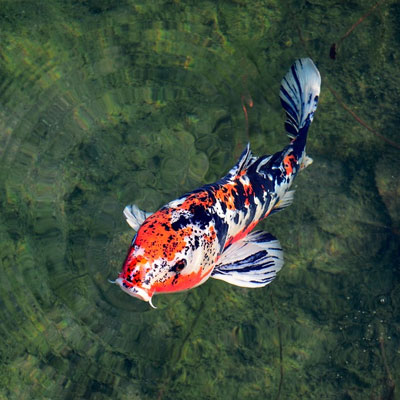Fish Health: Paying Attention to the Details
 Whether you have a large pond with sport fish or a backyard water garden with beautiful koi and goldfish, maintaining the health of your fish can be achieved by paying attention to key details. Optimum fish health is achieved with good nutrition, sanitation and good water quality.
Whether you have a large pond with sport fish or a backyard water garden with beautiful koi and goldfish, maintaining the health of your fish can be achieved by paying attention to key details. Optimum fish health is achieved with good nutrition, sanitation and good water quality.
Good nutrition is just as important to fish as it is to humans. It is important to provide your fish with good quality food to maintain growth and immune functions. Fish require the amino acids found in protein. Animal protein sources are generally better for fish than any plant source (like soy or wheat germ). Plant proteins alone are deficient in one or more of the essential amino acids needed by fish especially as their bodies are recovering from winter or preparing for winter.
These essential amino acids are used for many bodily functions including hormone production, tissue repair and fat storage. The best food for most fish is going to have “fishmeal protein” listed on the label. Even fish in natural ponds can benefit from pelletized food allowing them to reach larger sizes faster and give a good fight on the end of a fishing line
Sometimes the pond water needs to be treated for pathogens. Fish can be carriers of infectious agents and not show any symptoms. Because fish can harbor pathogens, experts recommend putting new fish in a quarantine tank before introducing it to the rest of your fish population. This will not only protect your fish collection from adding something harmful to your pond but it will also help protect the new fish from what might already be in your pond. Quarantine procedures are generally less important when introducing native fish to a larger natural environment.
It Starts With Water Quality
Good water quality is easier to achieve in large natural ponds but it is not impossible in small water gardens and goldfish ponds. The most important part of maintaining good water quality is to manage the waste as it moves through your system. As fish go about their daily lives they are breathing or respiring, eating and eliminating waste from their bodies. Most of the waste that comes out of their bodies is in the form of ammonia which is broken down by bacteria into nutrients that can be used by plants.
Expired aquatic plants also create waste that must be broken down and used in the system. The amount of waste that is in the system can be controlled by monitoring the amount of fish food given and removing any excess, trimming and removing plant parts as they turn brown or that have blown in and properly rinsing any equipment like filter pads that collect fine and coarse particles. Replacing 5 to 10 percent of the water volume with fresh water will also help improve water quality.
Using good sanitation practices and maintaining good water quality while providing quality food sources to fish will help your fish to stay healthy. Contact a professional pond service company like National Pond Service to discuss wayto improve the health of your pond fish.
